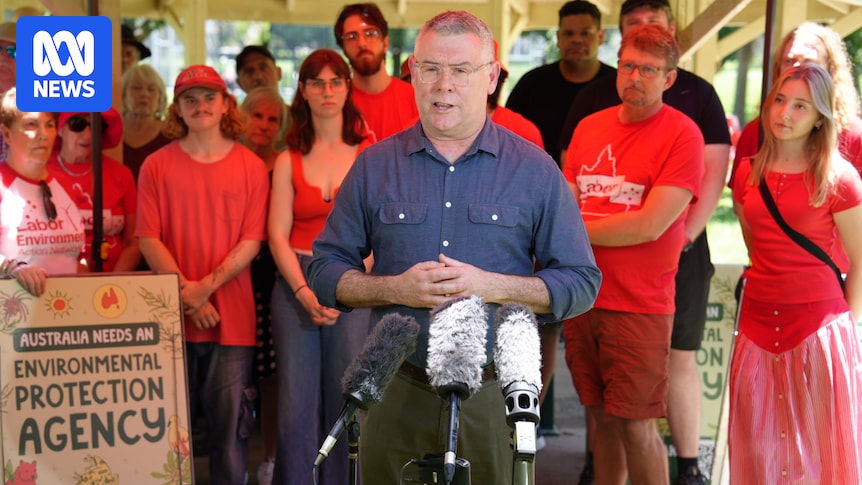
A critical standoff over environmental legislation is set to dominate the final week of Australia’s parliamentary year. Environment Minister Murray Watt has declared it “now or never” for his proposed bill, which aims to enhance the protection of natural landscapes and wildlife while streamlining the assessment process for large construction projects.
The federal government has spent three years attempting to reconcile the interests of business and environmental groups to deliver a much-needed overhaul of a system widely considered broken. The current framework is criticized for failing to adequately protect nature and causing significant delays for developers. Senator Watt revealed that he had extended concessions to both the opposition and the crossbench over the weekend.
“I’ve said all along that we’re willing to pass these reforms with either the Coalition or the Greens,” Senator Watt stated on Sunday. “This bill will deliver to both the environment and business; it’s not one or the other.”
Negotiations with the Greens and Coalition
The proposal to the Greens includes applying national standards to forest logging applications, a move that stops short of their demand to ban native forest logging entirely. Greens Senator Sarah Hanson-Young has yet to finalize her stance, indicating potential openness to negotiation.
Meanwhile, the Coalition has issued demands to dilute the powers of the new environmental agency, eliminate emissions reporting requirements, and clarify the minister’s authority to reject applications that pose “unacceptable” environmental harms. Opposition Leader Sussan Ley emphasized a constructive approach but warned against hasty decisions, suggesting a willingness to extend the bill into a prolonged committee review.
“It’s not our job to make a bad bill less bad … If Labor wants to rush, that is their choice,” she remarked on Friday.
Labor’s Response and Strategic Considerations
Senator Watt has indicated that while Labor is open to some of the Coalition’s demands, it will not concede on all points. A government source revealed that Labor is hesitant to weaken the environmental agency, a key issue for many of its MPs. Additionally, Labor is reluctant to remove climate reporting for large emitters, framing it as a transparency measure.
Treasurer Jim Chalmers expressed a preference for negotiating with the opposition to avoid business uncertainty, should the Coalition decide to reverse a Labor-Greens agreement in the future. However, the offer to the Greens is considered genuine, with some party members keen to avoid the perception of being obstructive, as seen in the previous parliament.
Several insiders suggest that Senator Hanson-Young is eager for a deal but may face challenges convincing colleagues, particularly those from Tasmania, who are more skeptical of the bill. The Greens also seek the removal of a longstanding exemption for pre-1999 land-clearing on private land.
“Don’t let the perfect be the enemy of the good,” Senator Watt cautioned the Greens, while urging the Coalition to “put [their] leadership battles to the side to focus on the needs of the country.”
Implications for Net Zero and Energy Policy
The passage of this bill is Labor’s top priority for the concluding week of the parliamentary session, coinciding with its intensified criticism of the Coalition for abandoning net zero commitments. Last week, Mr. Chalmers cited renewable energy investor modeling, which suggested that power bills could rise by 22% without renewable energy. On Sunday, he warned that abandoning net zero could jeopardize critical minerals projects.
“Abandoning net zero would swing a wrecking ball through the energy market, through investor certainty, and put billions of dollars of critical minerals projects at risk,” he stated.
In contrast, Liberal Senator James Paterson maintained that his party had established a “very strong position on net zero,” while continuing to criticize Climate Change and Energy Minister Chris Bowen’s leadership in upcoming international climate negotiations. Mr. Bowen, who recently engaged with international counterparts in Brazil, emphasized the challenges and importance of the upcoming COP31 conference, which Australia has ceded to Türkiye.
“This won’t be an easy negotiation, COP31. No one should pretend it will be. In one way, that’s why I’m looking forward to it so much,” Mr. Bowen commented.
As the parliamentary year draws to a close, the outcome of these negotiations will have significant implications for Australia’s environmental policy and its broader energy strategy. The decisions made in the coming days could shape the nation’s environmental and economic landscape for years to come.







